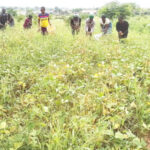Joel Usiagu is the Edo State Chairman of All Farmers Association of Nigeria (AFAN) as well as National Vice President South South Maize Growers, Processors and Marketers Association of Nigeria (SSMGPMAN). In this interview, he speaks on the challenges and why Edo smallholder farmers are not benefiting from both the state and federal governments inputs and other interventions.
What are the challenges facing farmers in Edo State?
The challenges facing farmers in Edo State are many but the major ones are education, insecurity, lack of access to finance and inputs. Farmers need to know that they have to follow best agricultural practices as the old patterns are no longer realistic. We have issue of climate change and because of that you have drought in southern Nigeria which is close to Atlantic Ocean while we see excess rainfall in the north which is close to the Sahara Desert. This shows there is shift in nature, so farmers should be proactive and look for varieties of improved seedlings and stems, and this is where education comes in.
Also, many farmers find it difficult to access fund from financial institutions such as commercial and microfinance banks and the only way farmers can get fund is to come together and form cluster associations, like cooperatives. Again, lots of farmers believe that they don’t need fertilizer and that they can just plant and harvest but when you use organic and inorganic boosters for crop production, there would be high yield and you will make more money.
- FACAN appeals to Gov Ayade to suspend cocoa, others regulations
- Town planners seek implementation of 30-yr-old urban planning law
Farmers in the state are complaining of not benefiting from both state and federal governments agricultural interventions. What is your take?
Yes, most of these policies are implemented in the state capital but farmers in the rural areas who have no access to radio and television don’t even know what is happening in the agric sector. For instance, the CBN introduced Agricultural Small Medium Enterprises Scheme where farmers were given between N6 or N7 million with about six years repayment period. It was managed by NIRSAL on behalf of the CBN and many people never heard of it. There was also COVID-19 loan for farmers which were only assessed online and many farmers don’t have Android phones in their farm camp. There was one by the Edo State government in collaboration with the Bank of Industry, it was a counterpart funding arrangement which SME farmers can access up to N10 million with a five years period of repayment but less than one percent of the farmers population are aware of it.
How can this be addressed?
We are working with the State Ministry of Wealth Creation and Cooperation, Ministry of Agriculture and Food Security, Ministry of Orientation and communication so that people are enlightened about these interventions. Today, we have brought many commodity associations to be part of AFAN in Edo State, so that they can know what is happening and take it back to their various structures across the state. For this to work, we have to create local government and ward structures. We use the structures to reach the real farmers at the grassroots. In accessing inputs and finance, the small holder farmers are at the bottom of the pyramid but we want to see how we can push inputs and finances to them and make them viable.
The farmers said most of these intervention funds are not getting to them but to those they described as political farmers
The condition to access these interventions and funds are cumbersome, and can only be assessed by politically exposed persons. For instance, if a farmer needs N10 million to grow five hectares of cocoa farm, they will ask for guarantor or collateral of two persons that have a turnover of N10 million in their account, where will these farmers get such collateral? It is only politicians that can easily get such collateral. Also, because of poor education, people in the village are not ready to assist themselves because they are afraid that they will be arrested if they didn’t pay back the money but the politicians can take risks to guarantee one another. Political farmers are those who are not practicing farming as occupation but they access finance using farming as a means, it doesn’t mean they are politicians but they are not practical farmers.
Political farmers are real, I don’t want to mention names and instances but it’s real and it exists.
Is this practice not inhibiting farmers’ progress?
It is putting a cog in the wheel of progress of the real farmers who the money and interventions are earmarked for. As I speak to you, billions have been disbursed by the NIRSAL microfinance bank. I got N10 million for over 70 people but the repayment is poor as less than 10 per cent are paying three years after the money was disbursed to them.
The farmers claim that the inputs from the federal and state are not getting to them?
Farmers are not getting the inputs because of the middlemen. Back again to the political farmers, they are actually the real middlemen, they take these inputs and sell them and it doesn’t get to the real farmers. Federal and State government intervention doesn’t get to the real farmers due to shortage of staff. The state government is limited by staff and the federal ministry of Agricultural only have a small office in Benin headed by the state director and they are less than 50 and we are talking about 100 wards to be covered in the state. Among those wards, over 70 per cent are rural and agrarian farm settlements, it is difficult to cover.
How can the activities of these middlemen be checked so that real farmers can benefit?
This can be checked by the deliberate attempt by the government to create storage and silos in every local government and if they are available inputs for each local government, it would be domiciled in the storage and silos in the area and it would be easier instead of relying on those middle men to move these inputs to the local governments. It would also be easier for the farmers to distribute them themselves through the central storage closest to their farm gate.
Extension service is also a problem to the farmers in Edo State. What is your take on this?
Most of these farmers don’t even know where to go and who to meet. We have extension service agents in the ministry of agriculture and ADP and most of these farmers don’t even know that they have to go to the ministry and ADP office in the local government. But I know that there are challenges because moving from one local government to the other can be very tasking due to poor road network and security challenges. What we are trying to do now is to train the trainers, who will in turn go their respective places and train the rest.

 Join Daily Trust WhatsApp Community For Quick Access To News and Happenings Around You.
Join Daily Trust WhatsApp Community For Quick Access To News and Happenings Around You.



